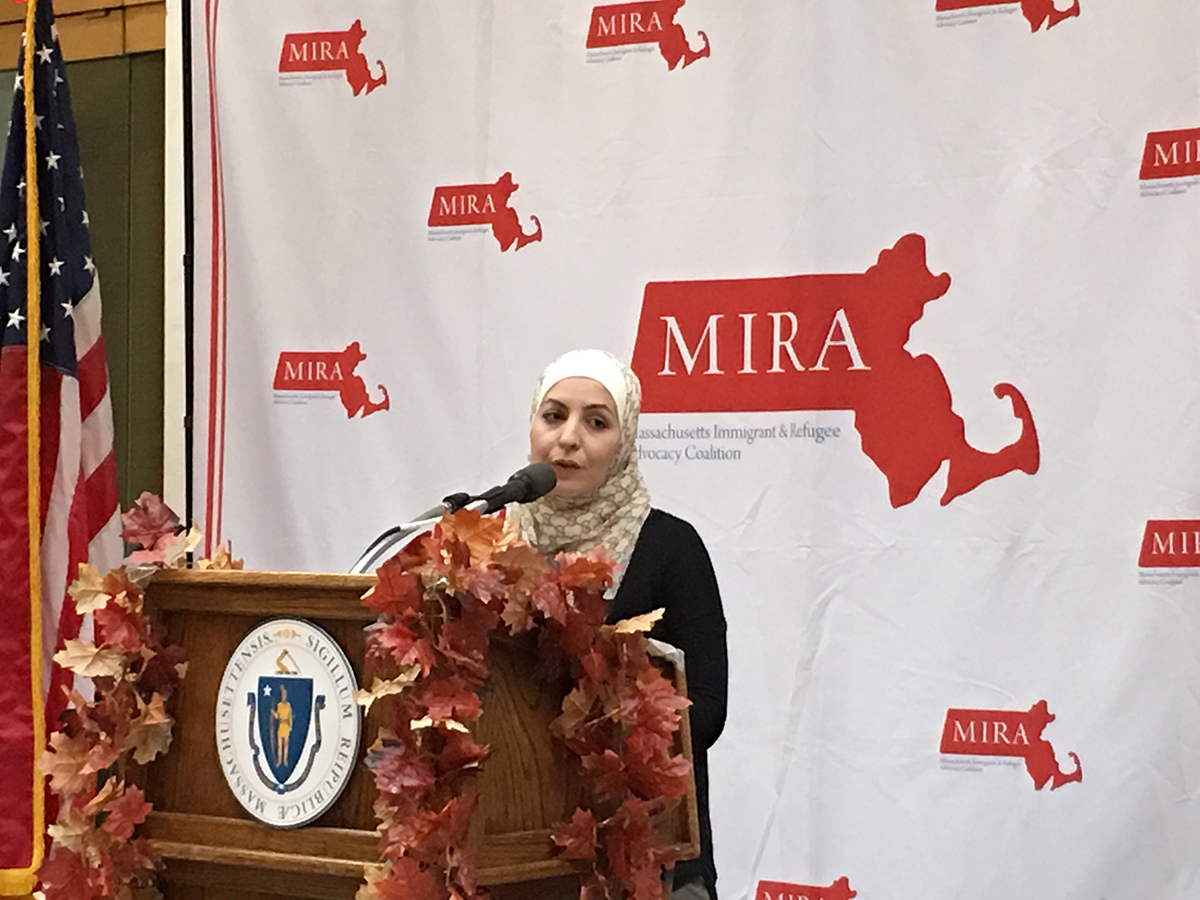Syrian Refugees Push Back Against Charlie Baker’s Refugee Comments

Amira Elamri of Watertown speaking at the MIRA luncheon. Photo by Garrett Quinn
Representatives of the Massachusetts Immigrant and Refugee Advocacy Coalition hosted their annual Thanksgiving luncheon on Monday, the same day that Gov. Charlie Baker announced that he was opposed to allowing Syrian refugees into the Commonwealth.
Baker told a gaggle of reporters on Monday that he wants to know more about the federal government’s vetting process for Syrian refugees before bringing more of them into Massachusetts.
“No, I am not interested in accepting refugees from Syria. I would need to know a lot more than I know now to agree to do anything,” Baker said at the time.
Baker’s comments raised the eyebrows of many of the luncheon’s attendees.
“We hope the governor will reconsider and continue to make Massachusetts a welcoming place for immigrants and refugees, including the refugees from Syria,” said MIRA Executive Director Eva A. Millona.
Millona said that Massachusetts has a strong reputation for helping immigrants and migrants, receiving on average 2,400 refugees a year.
Since the outbreak of the Syrian Civil War in 2011, Massachusetts has welcomed approximately 150 refugees from the war-torn country.
One of those refugees at the luncheon, Amira Elamri of Watertown, said she fled the Syrian Civil War in order to give her children a better life. Elamri arrived in Massachusetts in 2014 with her husband and two children and immediately applied for asylum. Elamri works as a teacher and her husband at a travel agency. Her son is in the Cub Scouts.
“Syrians are war refugees. We’re not all in ISIS. They left their property worth millions, spent hundreds of thousands to leave there. Syria is a land of civilization, of Christianity and Islam. We never wished to leave, but unfortunately our kids’ safety and their future is a priority,” said Elamri.
Elamri said she fled Syria not just because of ISIS, but because of President Bashar al-Assad’s government, too. She said Baker just does not understand what people like her are fleeing.
“Do you want to live in a place where there is war? Where the basic needs for a child, like safety, medicine, electricity, water, are not there? Would anybody like to live in that place? So if there is no way to accept refugees where should they go?” she asked. “It’s really sad for us, it’s heartbreaking.”
Elamri downplayed concerns about Islamic terrorists entering countries with other Syrian refugees, even though one of the Paris attackers may have entered Europe through Greece as a Syrian refugee.
“We don’t believe the Paris attacks were done by Syrians,” said Elamri.
Migrant experts believe governors like Baker do not have much authority when it comes to immigration and refugees.
Sarang Sekhavat, federal policy director at MIRA, said that while states do have offices that cater to in-state refugees and migrants, they do not have any real power to block them from entering their states.
“They could put in policies that would make life more difficult for these people, but you’re talking about people who are allowed into the United States because of the humanitarian issues that they’ve gone through. To further compound that would be morally a problem,” said Sekhavat.


